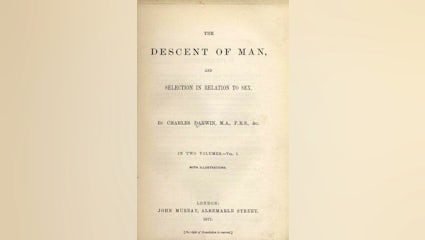
1871. Charles Darwin expands on evolutionary theory in his book The Descent of Man, and Selection in Relation to Sex to directly follow the concepts introduced in On the Origin of Species. In this volume, he applies his theories to human evolution and discusses concepts related to human "races," sexual differentiation and the relation of his evolutionary theory to human society. Most significantly, he discusses medical advances that allow "the weak" to reproduce, and cautions that reason (ie. disallowing their reproduction) should not replace sympathy.
The Descent of Man is criticized in some circles as being sympathetic to the eugenics movement. Darwin does explore eugenic ideas in many sections of this book, however, in most cases, these ideas are directly contradicted in subsequent paragraphs, which possibly led to the belief that Darwin supported eugenics. For example, the passage from The Descent of Man (1871) on pages 168 and 169:
"With savages, the weak in body or mind are soon eliminated. We civilized men, on the other hand, do our utmost to check the process of elimination. We build asylums for the imbecile, the maimed and the sick, thus the weak members of civilized societies propagate their kind. No one who has attended to the breeding of domestic animals will doubt that this must be highly injurious to the race of man. Hardly anyone is so ignorant as to allow his worst animals to breed.” (Darwin, 1871, Chapter V)
is followed by this paragraph:
"The aid which we feel impelled to give to the helpless is mainly an incidental result of the instinct of sympathy, which was originally acquired as part of the social instincts, but subsequently rendered, in the manner previously indicated, more tender and more widely diffused. Nor could we check our sympathy, if so urged by hard reason, without deterioration in the noblest part of our nature." (Darwin, 1871, Chapter V)
Similarly, the section of Chapter XXI states,
"Both sexes ought to refrain from marriage if they are in any marked degree inferior in body or mind; but such hopes are Utopian and will never be even partially realised until the laws of inheritance are thoroughly known. Everyone does good service, who aids towards this end. When the principles of breeding and inheritance are better understood, we shall not hear ignorant members of our legislature rejecting with scorn a plan for ascertaining whether or not consanguineous marriages are injurious to man." (Darwin, 1871, Chapter XXI)
but is immediately followed by this paragraph, emphasizing that the success of men is due to diversity, and reproduction should not be controlled by laws:
"The advancement of the welfare of mankind is a most intricate problem: all ought to refrain from marriage who cannot avoid abject poverty for their children; for poverty is not only a great evil, but tends to its own increase by leading to recklessness in marriage. On the other hand, as Mr. Galton has remarked, if the prudent avoid marriage, whilst the reckless marry, the inferior members tend to supplant the better members of society. Man, like every other animal, has no doubt advanced to his present high condition through a struggle for existence consequent on his rapid multiplication; and if he is to advance still higher, it is to be feared that he must remain subject to a severe struggle. Otherwise he would sink into indolence, and the more gifted men would not be more successful in the battle of life than the less gifted. Hence our natural rate of increase, though leading to many and obvious evils, must not be greatly diminished by any means. There should be open competition for all men; and the most able should not be prevented by laws or customs from succeeding best and rearing the largest number of offspring." (emphasis added) (Darwin, 1871, Chapter XXI)
Darwin concludes his book by proposing that men are evolved from "barbarians," and although this is distasteful to some, it is true. He is careful to state that although man may have risen from this lowly status, it was "not through his own exertions," and places great emphasis on morality and sympathy being hallmarks of an evolved being.
This book has entered the public domain and is available as an e-book. You can read it here. More information about Darwin and his works, including full copies his publications, is available at The Complete Work of Charles Darwin Online.
-Colette Leung and Amy Dyrbye
Darwin, C. (1871). The Descent of Man, and Selection in Relation to Sex. New York: D. Appleton and Company.
Expelled Exposed. (n.d.). Hitler & Eugenics. Retrieved from: http://www.expelledexposed.com/index.php/the-truth/hitler-eugenics
 1869:
Galton publishes Hereditary Genius
1869:
Galton publishes Hereditary Genius
 1871:
Charles Darwin publishes The Descent of Man
1871:
Charles Darwin publishes The Descent of Man